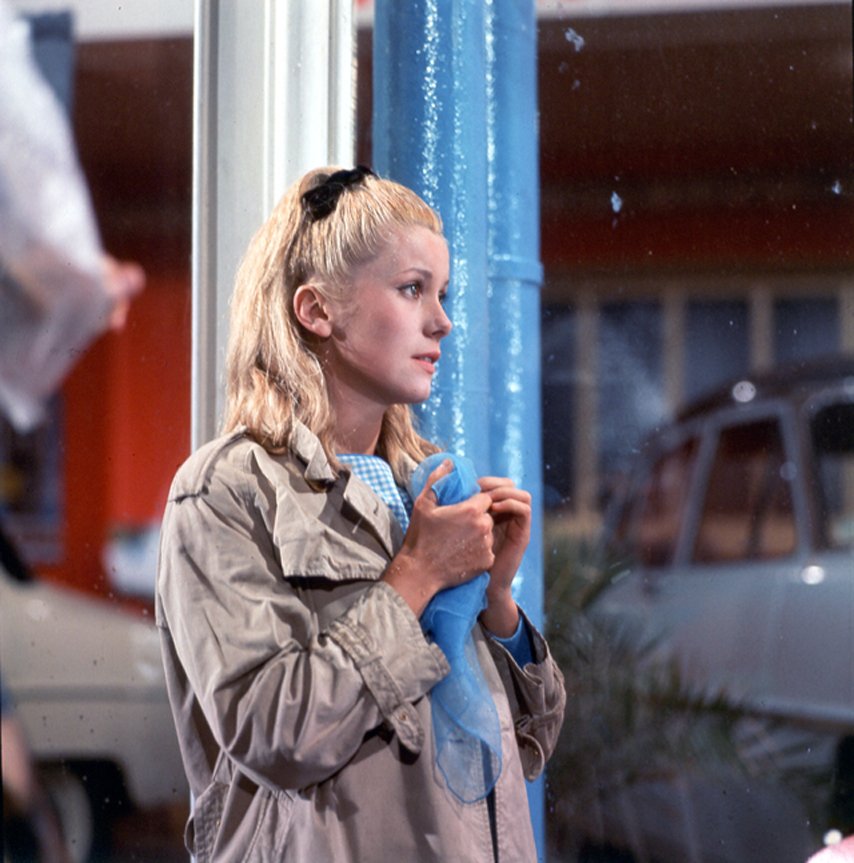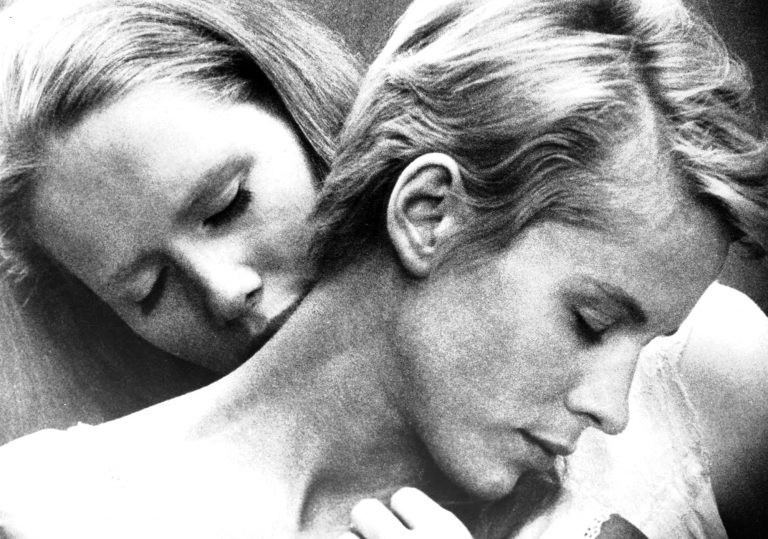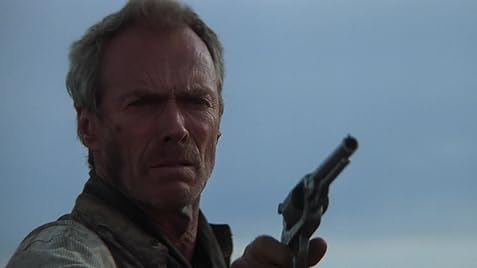ahwell's Top 100 Movies - 2020
→ in Movie Reviews
I liked it well enough. It’s a well made movie. But I wasn’t as hype about it as everyone else seems to be.
X
Favorite Movies
X
User Lists

70. The Umbrellas of Cherbourg (1964)
That aching sensation of loss. That feeling of pain, that something tender in the heart has been destroyed. Or perhaps not destroyed, but mangled and bruised. And in that, there is beauty.
The beauty of loss and pain is what I see most in The Umbrellas of Cherbourg's many deep and profound ideas. It's also a theme I see a lot in the operas of Puccini. Even the music of these operas - Tosca, La Boheme, Madama Butterfly, etc - is of a type I closely relate to The Umbrellas of Cherbourg.
I've seen this movie compared to an "opera", and while that's probably the closest comparison one could make, I'm still not fully sure I agree with it. One might as well compare it to Singin' in the Rain or West Side Story. Take, for instance, the early operas of the Baroque and Classical era. Admittedly, I'm not too familiar with Baroque opera (Monteverdi, Lully, Purcell to name a few), however I love the operas of Mozart. The Marriage of Figaro may be one of the single greatest artistic and political achievements of the last 300 years. However, watching/listening to these operas shows that they are in fact more closely related to Broadway musicals than to The Umbrellas of Cherbourg. They have short recitatives between songs (arias). Or, in the case of singspiels like the Magic Flute, they have real spoken words between musical numbers. This developed into the 19th century with Rossini and Verdi among others developing the aria form. Starting with Wagner, though, you get the leitmotif, which finally begins the type of opera that I think is most closely related to the Umbrellas of Cherbourg. Strauss and Puccini (and a whole score of 20th century opera composers) developed the leitmotif, or a short musical idea that symbolizes a character or theme in the opera. Wagner took this at face value, and if you want to understand the leitmotif you should listen to the Ring Cycle, which packs hundreds of leitmotifs into it's 14 hour runtime. Strauss and Puccini added their own flare. Strauss wrote modernized Wagnerian music (although still his own style). Puccini, however, fused the ideas of Wagner and of traditional aria style Italian opera, and made masterpieces.
If you listen to something like La Boheme (one of the most heartbreaking love stories ever?), and then compare the simple beauty of the music to the Umbrellas of Cherbourg, you'll know what I mean. Ravishingly, wistfully beautiful music...
Sorry for the primer on 300 years of opera. I just wanted to point out the comparison and how Umbrellas has more in common with many Broadway musical than Baroque opera. So if you can't tell, I love the music to Umbrellas of Cherbourg. I've read some criticisms of the use of music (is it really necessary all the way through) and I guess I understand where these opinions are coming from. If it's not your style of music you won't vibe with it. However, to me the sung-through dialogue elevates every boring, daily-life moment in the Umbrellas of Cherbourg to a graceful, transcendent, aching experience. So I love it, and the film wouldn't be the same without it. Besides, the mix of jazz elements with Puccini-style "soaring melody, lush strings" Italian opera sound is something I just adore. They sure did use those melodic (and harmonic) sequences a LOT though. I think it was just a filler for the classic recitative.
Anyways, enough about the music. The Umbrellas of Cherbourg - along with that "beautiful pain" I described above - has a rare quality to it that I don't seen in many films. It's the use of the passage of time to set up characters and relationships. I'm aware that tons of movies use passage of time for their stories, but Umbrellas makes it a plot point. We get these brief segments of life, between months, between years. It's all surreal, and when the music plays over the passage of time you can imagine the characters growing and building. A film I can compare it to is the Tree of Life. Utterly unique.
While I had to ask myself if I was really connecting to any of the characters, since I've never had any romantic relationship of any kind, I realized by the end that that's not what Umbrellas is about. For me, it's about how we experience loss, guilt, and longing. How people DO really die of heartbreak outside the movies, or at least their soul does. Umbrellas also brings up the question about what is the better kind of love. Young, fresh, sexual, exuberant, passionate love? Or slow, relationship-focused, heartfelt, yet still in a way passionate love? For something that seems so on the surface, I don't see a lot of movies cover the topic so head on. Umbrellas of Cherbourg doesn't truly argue in favor of either. It merely tells us that the hurts of life happen, and to move on from that and create our own beauty is what matters. Both characters eventually find their partner through that second kind of love; although Guy may be a little happier with it than Genevieve. Ironically, the only reason he is happier is likely because Genevieve got whisked away to be married first. He was bitter. Cold. Depressed. And it was in Madeleine that he found solace, eventually love.
Culminating in that bittersweet final scene. Christmas time. It's snowing at night. And a lone car pulls up at the gas station. They see each other. A glimpse, and then realization. They chat. It's mostly her talking. And then, the instant is over. The instant where the two timelines met, whether by fate or by God's doing. It's blissful and depressing. Romantic and tragic. We both wanted it to happen and begged it not to happen.
The cinematography is gorgeous, with graceful, sweeping, moving, shots. It feels alive, and the vibrant colors probably help that.
In fact, everything in the Umbrellas of Cherbourg feels alive. The locations, the music, the characters. The moments of inconsolable grief, and - more optimistically - the moments of utter bliss. As a moviegoing experience, that is exactly what Umbrellas of Cherbourg is. Utter bliss.
X
User Lists
Another film I haven't seen but am fairly certain I would hate.
__________________
X
Favorite Movies
X
User Lists
Another film I haven't seen but am fairly certain I would hate.
X
Favorite Movies
X
User Lists
I liked this one. But when I saw it quite a few years ago, I feel like I didn’t really focus enough on the story that you talk about in your review. Don’t think I’ll ever revisit it though. But I liked the experience of my first watch.
X
Favorite Movies
X
User Lists
The Umbrellas of Cherbourg (1964)....Top 10 for me, it's in my profile!
It was my nom in the Foreign Language HoF and it won! I love that film and I so can relate to it.
Oddly enough just last night I seen Catherine Deneuve in another French musical,Peau d'âne eng:Donkey Skin (1970) Not nearly as good as The Umbrellas of Cherbourgh.
It was my nom in the Foreign Language HoF and it won! I love that film and I so can relate to it.
Oddly enough just last night I seen Catherine Deneuve in another French musical,Peau d'âne eng:Donkey Skin (1970) Not nearly as good as The Umbrellas of Cherbourgh.
X
Favorite Movies
X
User Lists
Love Peeping Tom. Just thought someone should show up for it.  Rear Window was one of the better Hitchcock films, though the last time I watched it I was a little bored. I should watch it again sometime to see how I feel now.
Rear Window was one of the better Hitchcock films, though the last time I watched it I was a little bored. I should watch it again sometime to see how I feel now.
 Rear Window was one of the better Hitchcock films, though the last time I watched it I was a little bored. I should watch it again sometime to see how I feel now.
Rear Window was one of the better Hitchcock films, though the last time I watched it I was a little bored. I should watch it again sometime to see how I feel now.
__________________
5-time MoFo Award winner.
5-time MoFo Award winner.
X
Favorite Movies
X
User Lists

69. Persona (1966)
I don't understand. I don't understand the look in your eyes when I tell you my truths. I've poured my soul out, yet you turn your head, say not a word, do not a thing.
I don't understand. The days and nights we've spent together, cooped up. Come rain and come shine. By water or by rocks or by the bed. So much time. Are we getting closer or farther apart?
I don't understand. The letters you write, the thoughts I have concealed in your trust; you send them off to be read and to be judged. I did not give you permission. I am not you.
I don't understand. You're cryptic, and you laugh when I cry. You're prettier. and more famous. and perhaps more happy. But I could be you. I don't want to, though.
I don't understand. You hide your thoughts and your words, keep them in a bundle so that no one can know. Know what? See what?
I don't understand. What are you afraid of? The shadows that conceal your face? That they will close in on you one day, soon? That when they do close in you will not know yourself?
I don't understand. It's too dark to see you. There are shadows everywhere. I want to touch you, know you, feel you. But you are concealed. By shadows and grief and guilt.
I don't understand. Perhaps I never will. Is that the point? Must we understand to feel? Must we know to appreciate?
I don't understand. Please, Please, Alma, answer me. Speak. I am tired of talking. I am tired of living. I am tired of the shadows covering my face, and yours. I want to see.
But most of all; I don't understand this movie
 . still love it though!
. still love it though!
X
User Lists
I've not seen Persona, I'm not a big fan of Bergman so I've only seen like 3 of them from HoFs.
X
Favorite Movies
X
User Lists
Persona's great, but I don't think it'd still make the cut if I redid my top 100. If I include Bergman next time, it'll more likely be Wild Strawberries.
X
Favorite Movies
X
User Lists
I loved Persona. Wouldn’t mind seeing it again. But first I would rather get more Bergman crossed off my list. I like the guy.
X
Favorite Movies
X
User Lists

68. Unforgiven (1992)
Wasn't expecting that. Unforgiven blew me away with it's fascinating characters, dark and gritty tone, and morally complex plot. The story is twisted and often disturbing, and we often switch between which characters we're rooting for.
Violence plays such a huge role in this movie, and Clint Eastwood handles it beautifully. Violence of all types is shown, often brutal, and Eastwood's messages about the dangerous cycle of it all are only too prevalent.
Because that is exactly what this movie is about. A cycle of never-ending violence in the Old West, and in our modern culture too. Not just violence, but toxicity. One prostitute's face is cut up, so the rest of the prostitutes offer a reward for killing the cowboys that did it. That sets off a whole new turn of bloodshed, ending in the loss of many innocent lives.
That ending scene is tragic and powerful. I don't think we're supposed to sympathize with any character in the movie, other than perhaps some of the prostitutes. Most of the male characters are toxic and evil, and Clint's character - while quiet and often contemplative - did kill many in his youth and in the end he goes on one last spree. What was it? Did he not feel redeemed for giving up violence? Had he had enough and just decided to shoot away, angry at the loss of his friend? His brutal murders at the end bring this epic tale to a close with more melancholy than I've ever seen in a Western.
And, yes this is totally "The Irishman" for Eastwood. Remember, this was the last Western he ever acted in. It brings an end to an era, and Clint knew his time as an actor was waning.
This movie I just think is way more relevant and important today than people give it credit for.
X
User Lists

68. Unforgiven (1992)
Unforgiven was one of the few Clint Eastwood westerns that I liked, and I think it was the only one that I considered for my top westerns list.
__________________
.
If I answer a game thread correctly, just skip my turn and continue with the game.
OPEN FLOOR.
.
If I answer a game thread correctly, just skip my turn and continue with the game.
OPEN FLOOR.
X
Favorite Movies
X
User Lists

68. Unforgiven (1992)
Wasn't expecting that. Unforgiven blew me away with it's fascinating characters, dark and gritty tone, and morally complex plot. The story is twisted and often disturbing, and we often switch between which characters we're rooting for.
Violence plays such a huge role in this movie, and Clint Eastwood handles it beautifully. Violence of all types is shown, often brutal, and Eastwood's messages about the dangerous cycle of it all are only too prevalent.
Because that is exactly what this movie is about. A cycle of never-ending violence in the Old West, and in our modern culture too. Not just violence, but toxicity. One prostitute's face is cut up, so the rest of the prostitutes offer a reward for killing the cowboys that did it. That sets off a whole new turn of bloodshed, ending in the loss of many innocent lives.
That ending scene is tragic and powerful. I don't think we're supposed to sympathize with any character in the movie, other than perhaps some of the prostitutes. Most of the male characters are toxic and evil, and Clint's character - while quiet and often contemplative - did kill many in his youth and in the end he goes on one last spree. What was it? Did he not feel redeemed for giving up violence? Had he had enough and just decided to shoot away, angry at the loss of his friend? His brutal murders at the end bring this epic tale to a close with more melancholy than I've ever seen in a Western.
And, yes this is totally "The Irishman" for Eastwood. Remember, this was the last Western he ever acted in. It brings an end to an era, and Clint knew his time as an actor was waning.
This movie I just think is way more relevant and important today than people give it credit for.

__________________
I came here to do two things, drink some beer and kick some ass, looks like we are almost outta beer - Dazed and Confused
101 Favorite Movies (2019)
I came here to do two things, drink some beer and kick some ass, looks like we are almost outta beer - Dazed and Confused
101 Favorite Movies (2019)
X
Favorite Movies
X
